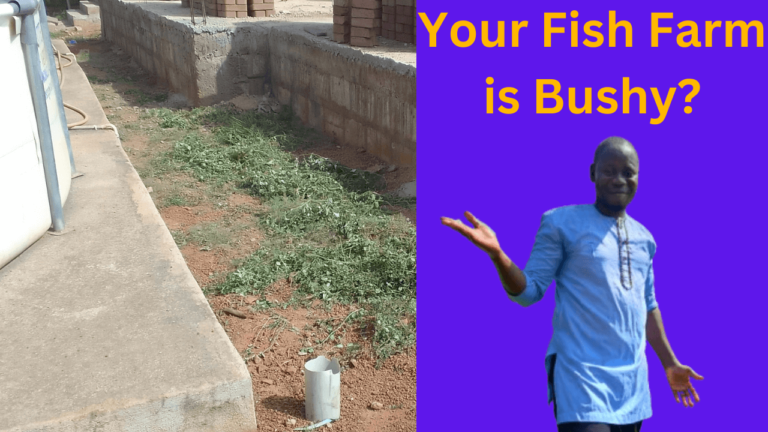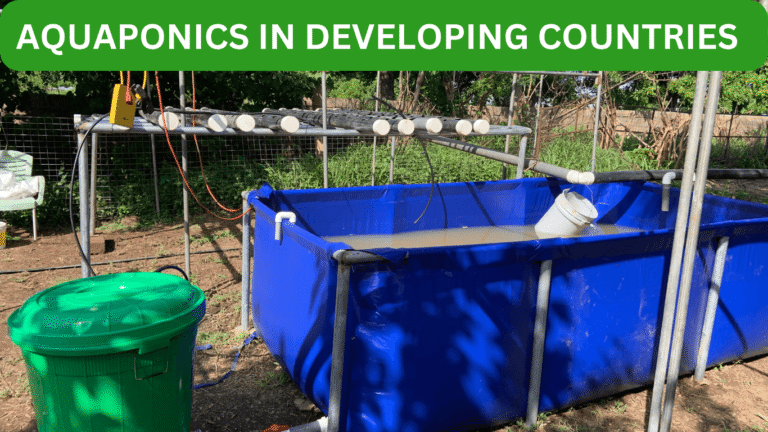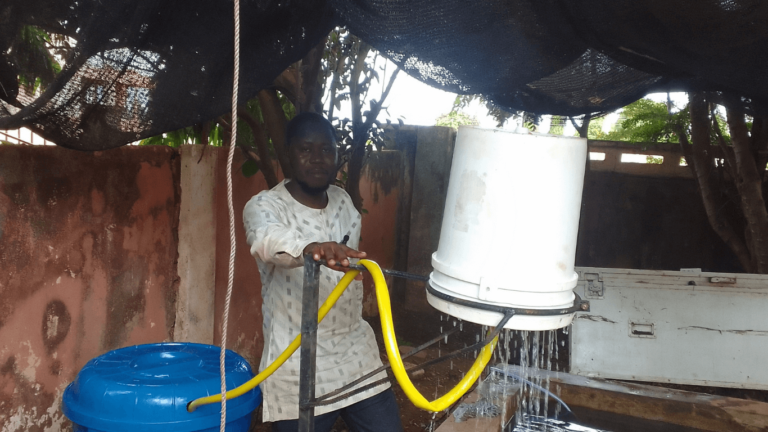11 reasons why weeding around a fish farm is essential for success gives you the reasons you have to always keep your fish farm tide and clean as part of fish pond management.
Weeding is a task often overlooked by many fish farmers, but it plays a crucial role in maintaining a productive and safe environment for your fish farming operations.
Beyond just keeping the surroundings tidy, regular weeding has practical and economic benefits that can significantly impact the success of your fish farm.
In this article, we’ve explored 11 reasons why weeding around a fish farm is essential for success, diving into how this simple practice can protect your investment, improve farm efficiency, and promote healthier fish.
1. Prevention of Predators
Weeds offer perfect hiding spots for predators like snakes, rats, and even lizards.
These animals often lurk near overgrown areas, waiting for the opportunity to prey on your fish. By keeping your farm free of weeds, you eliminate their hiding places, therefore reducing predation risks.
For example, I know a fish farmer in a rural area who noticed a significant drop in his fish losses after consistently clearing weeds. Because it deterred snakes and other predators from invading his ponds, this small habit can save you from the financial loss caused by fish predation.
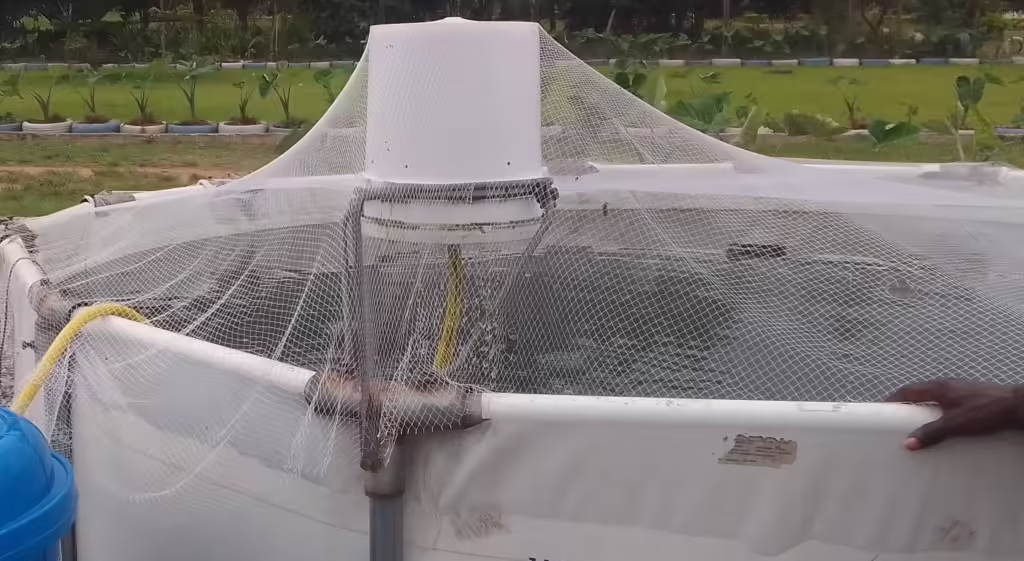
Fish pond covered with predation net to prevent birds
2. Improved Accessibility
Clear pathways are vital for fish farmers to carry out daily activities such as feeding, water monitoring, and pond maintenance. Overgrown weeds can obstruct these pathways, slowing down your operations and making tasks unnecessarily difficult.
Weeding regularly ensures your movement around the farm remains unhindered, allowing you to be more efficient with your time and effort. When emergencies occur, such as needing to fix a pond leak, clear pathways can save you critical minutes.
3. Better Drainage and Water Flow
Weeds near drainage channels or around pond embankments can obstruct the natural flow of water. This can lead to waterlogging, which might cause structural damage to your ponds or affect water quality.
When water comes to pass after rainfall, the roots of the grass will try to prevent it. And for water, it will always find its way and that way might not be well for you as the farmer. It can cause floods. Therefore learning the 11 reasons why weeding around a fish farm is essential and implementing them will help you tremendously.
Clearing weeds ensures that your drainage systems function optimally, preventing water accumulation and maintaining the balance necessary for a healthy aquatic environment.
4. Pest Control
Weeds provide a breeding ground for pests, such as mosquitoes and other insects. These pests can carry diseases harmful to both your fish and you as the farmer.
For example, mosquitoes can spread pathogens that lead to water contamination, affecting fish health and growth.
When the mosquitoes even bite you as the fish farmer, you may get malaria.
By removing weeds, you disrupt these breeding grounds, creating a healthier and safer environment for your fish and reducing the risk of disease outbreaks.
5. Reduced Competition for Resources
If you have crops or plants growing as part of an integrated fish farming system, weeds can compete with them for essential resources like sunlight, water, and nutrients. This competition can stifle the growth of beneficial plants and reduce the overall productivity of your farm.
For instance, we always grow tomatoes on our farm. These tomatoes always grow with the weeds and we constantly remove the weeds to allow only the tomatoes to grow. Failure to do that means the weeds will compete with the tomatoes for nutrients in the soil.
Weeding ensures that only the plants you intentionally grow around your farm get the resources they need to thrive, ultimately benefiting your fish farming operation.
6. Prevention of Structural Damage
Weeds might seem harmless, but their roots can grow deep into pond embankments, walls, or drainage systems, causing cracks or leaks over time. This structural damage can lead to costly repairs or even complete pond failure.
The common plant or tube that cracks even buildings and concretes is the false yam. The tube is so strong and can break your fish pond even concrete fish ponds which are said to be the strongest.
By addressing weeds early, you protect your infrastructure and avoid unexpected expenses. Regular inspections and weeding ensure the longevity of your ponds and farm structures.
7. Fire Hazard Prevention
During dry seasons, overgrown weeds dry out, turning into flammable materials that pose a fire risk. Fires can devastate your fish farm, damaging equipment, ponds, and even killing fish.
Regular weeding minimizes this risk, keeping your farm safe from accidental fires. Additionally, it reassures visitors and investors that your farm is well-managed and secure.
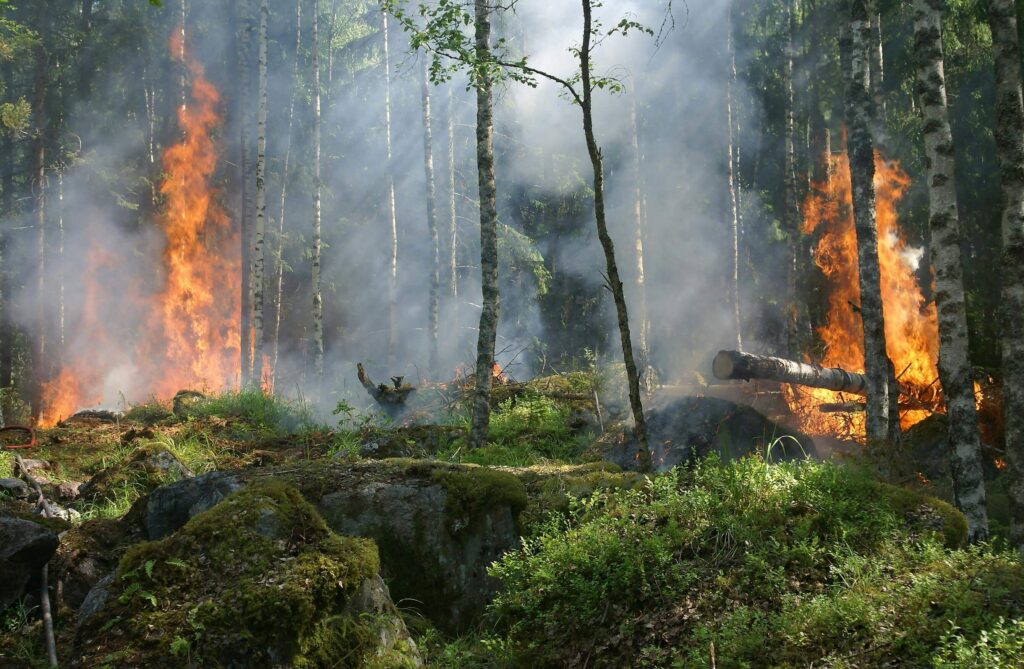
Bush Fire
8. Improved Aesthetics
A weed-free fish farm is more visually appealing, leaving a positive impression on visitors, customers, and potential investors. The appearance of your farm can influence perceptions of professionalism and care, which are critical for building trust in your brand.
Imagine taking a potential business partner on a tour of your farm; a clean, well-maintained environment will likely win their confidence more than a farm overrun with weeds.
Remember “first impression is very important”
9. Enhanced Airflow
Overgrown vegetation can hinder airflow around ponds, reducing oxygen levels in the water. Poor aeration affects fish health and growth, leading to stunted development or increased mortality rates.
Clearing weeds promotes better air circulation, which is particularly important in natural or earthen ponds where oxygen exchange relies heavily on the surrounding environment.
10. Easier Monitoring and Security
Weeds make it harder to spot trespassers, predators, or potential issues like cracks in embankments.
When fish even jump out and the place is bushy, it’s difficult to see it and it might die.
A weed-free farm allows you to monitor your surroundings effectively, improving security and enabling you to detect problems early.
Clear visibility around your ponds also discourages theft, as potential intruders are less likely to target a farm where their movements can be easily seen.
11. Reduction of Organic Waste
When weeds grow too close to ponds, their leaves and stems often fall into the water and decompose. This process releases organic waste into the water, reducing its quality and causing problems like algae blooms or foul odors.
By weeding regularly, you prevent organic material from contaminating the water, ensuring a healthier environment for your fish to thrive.
How To Weed Around a Fish Farm
1. Use the Right Tools: Invest in efficient tools like machetes, hoes, rakes, or brush cutters for quicker weeding.
2. Schedule Regular Maintenance: Set a fixed weeding schedule to stay consistent and prevent overgrowth.
3. Dispose of Weeds Properly: Burn or compost the weeds away from the ponds to avoid contamination.
Conclusion
Weeding around your fish farm is more than just a maintenance task—it’s a proactive measure that protects your fish, improves farm efficiency, and ensures the long-term sustainability of your operations. From preventing predators to enhancing aesthetics and ensuring proper drainage, the benefits of weeding are undeniable.
Make it a priority to include regular weeding in your farm management routine, and you’ll see significant improvements in both the health of your fish and the overall success of your farm. If you follow the 11 reasons why weeding around a fish farm is essential for success, you will achieve success in your fish farming endeavor. For more fish farming tips and strategies, visit Faako Aquaponics YouTube channel, where we provide practical advice to help you grow your aquaculture business.


